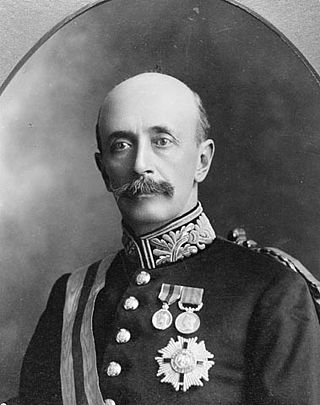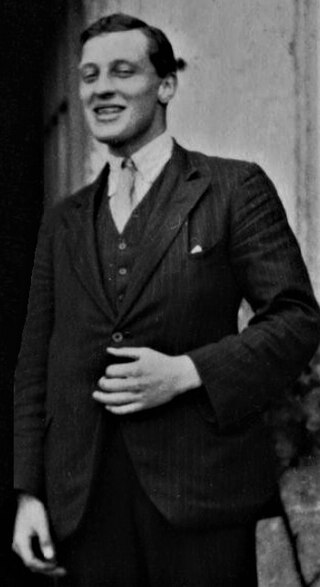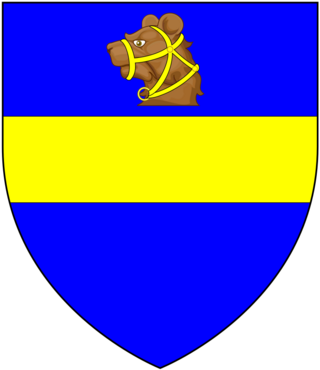Related Research Articles

Albert Henry George Grey, 4th Earl Grey, was a British peer and politician who served as Governor General of Canada from 1904 to 1911, the ninth since Canadian Confederation. He was a radical Liberal aristocrat and a member of a string of liberal high society clubs in London. An active and articulate campaigner in late Victorian England, he was associated with many of the leading Imperialists seeking change.

William Wyndham Grenville, 1st Baron Grenville, was a British Pittite Tory politician who served as Prime Minister of the United Kingdom from 1806 to 1807, but was a supporter of the Whigs for the duration of the Napoleonic Wars. As prime minister, his most significant achievement was the abolition of the slave trade in 1807. However, his government failed to either make peace with France or to accomplish Catholic emancipation and it was dismissed in the same year.

Earl Grey is a title in the peerage of the United Kingdom. It was created in 1806 for General Charles Grey, 1st Baron Grey. In 1801, he was given the title Baron Grey of Howick in the County of Northumberland, and in 1806 he was created Viscount Howick in the County of Northumberland, at the same time as he was given the earldom. A member of the prominent Grey family of Northumberland, Earl Grey was the third son of Sir Henry Grey, 1st Baronet of Howick.

Earl of Cromer is a title in the Peerage of the United Kingdom, held by members of the British branch of the Anglo-German Baring banking family.
Baron Howick of Glendale, of Howick in the County of Northumberland, is a title in the Peerage of the United Kingdom. It was created in 1960 for Sir Evelyn Baring, the former Governor of Kenya. A member of the famous Baring family, he was the third and youngest son of Evelyn Baring, 1st Earl of Cromer, and the great-grandson of Sir Francis Baring, 1st Baronet, the founder of Barings Bank. Baring's uncle was Edward Baring, 1st Baron Revelstoke, the father of Maurice Baring, while other members of the family include Francis Baring, 1st Baron Northbrook, and Alexander Baring, 1st Baron Ashburton. As of 2014 the title is held by the first Baron's son, the second Baron, who succeeded in 1973.

Baron Ashburton, of Ashburton in the County of Devon, is a title that has been created twice, once in the Peerage of Great Britain and once in the Peerage of the United Kingdom. Since 1835, the title has been held by members of the Baring family.

Baron Northbrook, of Stratton in the County of Southampton, is a title in the Peerage of the United Kingdom. It was created in 1866 for the Liberal politician and former Chancellor of the Exchequer, Sir Francis Baring, 3rd Baronet. The holders of the barony represent the genealogically senior branch of the prominent Baring family. The name Northbrook is derived from a tithing of the local parish.
Baron Revelstoke, of Membland in the County of Devon, is a title in the Peerage of the United Kingdom. It was created on 30 June 1885 for the businessman Edward Baring, head of the family firm of Barings Bank and a member of the Baring family. Baring was the son of Henry Baring, third son of Sir Francis Baring, 1st Baronet, and the nephew of Alexander Baring, 1st Baron Ashburton, the second cousin of Francis Baring, 1st Baron Northbrook, the elder brother of Evelyn Baring, 1st Earl of Cromer and the uncle of Evelyn Baring, 1st Baron Howick of Glendale. He was succeeded by his second but eldest surviving son John, the second Baron. John was a partner in Baring Brothers and Co. Ltd, a Director of the Bank of England, and also served as Lord Lieutenant of Middlesex. On his death the title passed to his younger brother Cecil, the third Baron. He acquired Lambay Island, north of Dublin, in 1904. As of 2017 the title is held by his great-grandson, the seventh Baron, who succeeded his father in 2012.

Evelyn Baring, 1st Baron Howick of Glendale,, was Governor of Southern Rhodesia from 1942 to 1944, High Commissioner for Southern Africa from 1944 to 1951, and Governor of Kenya from 1952 to 1959. Baring played an integral role in the suppression of the Mau Mau rebellion. Together with Colonial Secretary Alan Lennox-Boyd, Baring played a significant role in the government's efforts to deal with the rebellion, and see Kenya through to independence. Baring was aware of abuses against Mau Mau detainees. He was elevated to being the 1st Baron Howick of Glendale in 1960.

Charles Robert Grey, 5th Earl Grey DL, styled Viscount Howick between 1894 and 1917, was an English nobleman, the son of Albert Grey, 4th Earl Grey.

Howick Hall, a Grade II* listed building in the village of Howick, Northumberland, England, is the ancestral seat of the Earls Grey. It was the home of the Prime Minister Charles, 2nd Earl Grey (1764–1845), after whom Earl Grey tea is named. Howick Hall is the location of the Howick Hall Gardens & Arboretum.

Edward Charles Baring, 1st Baron Revelstoke, was a British banker.

Robert Stayner Holford (1808–1892), of Westonbirt, in the village of Weston Birt, Gloucestershire, MP for East Gloucestershire, was a wealthy landowner, gardening and landscaping enthusiast, and an art collector. With his vast wealth, he rebuilt Westonbirt House from the Georgian mansion erected only decades earlier by his father, and founded the Westonbirt Arboretum after succeeding his uncle and father between 1838 and 1839. His London home was Dorchester House.

Sir Edward Humphry Tyrrell Wakefield, 2nd Baronet, is an English baronet and expert on antiques and architecture.
Henry Baring was a British banker and politician. He was the third son of Sir Francis Baring, 1st Baronet, the founder of the family banking firm that grew into Barings Bank. His grandfather Johann Baring emigrated from Germany and established the family in England.
Baring is a surname. Notable people with the surname include:

The Baring family is a German and British family of merchants and bankers. In Germany, the family belongs to the Bildungsbürgertum, and in England, it belongs to the aristocracy.
Heaton Castle in the parish of Cornhill-on-Tweed, Northumberland, England, is a ruined historic castle near the Scottish border.
Mary Elizabeth Lalage Wakefield is a British journalist, and a columnist and commissioning editor for The Spectator.
Evelyn Rowland Esmond Baring, 4th Earl of Cromer, styled Viscount Errington from 1953 to 1991, is a British peer and businessman. He was managing director of Inchcape (China) Ltd. and a director of Schroder Asia Pacific Fund PLC. As Earl of Cromer, he was a member of the House of Lords from 1991 to 1999.
References
- ↑ 'HOWICK OF GLENDALE', Who's Who 2014, A & C Black, an imprint of Bloomsbury Publishing plc, 2014.
- ↑ Lady Howick is Chairman of Eventing at the Pony Club.
- ↑ Howick Hall Gardens website. Retrieved 7 June 2022.
